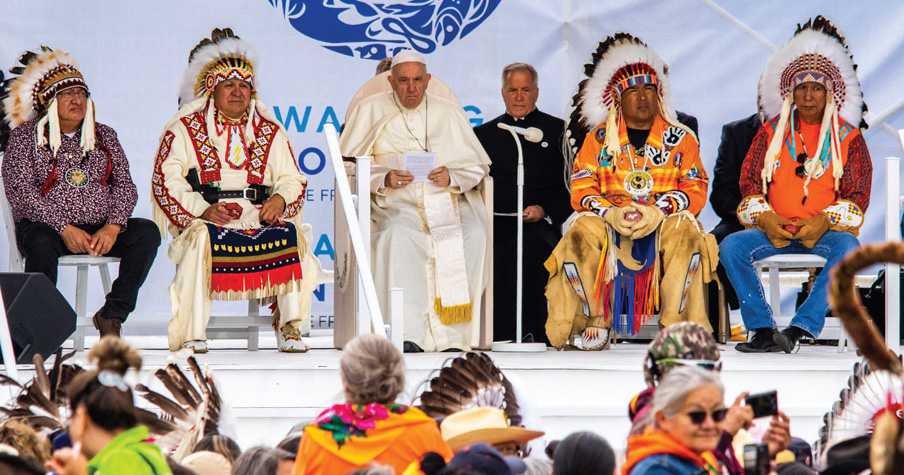
Photo: SIPA USA via AP Images
I have come to your native lands to tell you in person of my sorrow, to implore God’s forgiveness, healing, and reconciliation, to express my closeness and to pray with you and for you.”
With these words, Pope Francis delivered an unprecedented apology for the Catholic Church’s involvement in Indigenous residential schools in Canada. During his six-day visit in July, which the Pope referred to as a “penitential pilgrimage,” he acknowledged the Catholic Church’s role in establishing and running the residential school system which operated in Canada for more than 100 years. The last school in Canada closed in 1996.
“Our own efforts are not enough. We need God’s Grace. We need the quiet and powerful wisdom of the Spirit, the tender love of the Comforter.”
– Pope Francis
Canada’s Truth and Reconciliation Commission, which heard from survivors of the system and their descendants and shared its findings in 2015, concluded that: “...the central goals of Canada’s Aboriginal policy were to eliminate Aboriginal governments; ignore Aboriginal rights; terminate the Treaties; and, through a process of assimilation, cause Aboriginal peoples to cease to exist as distinct legal, social, cultural, religious, and racial entities in Canada.”
Residential schools have been acknowledged to be a central element of this. More than 150,000 First Nations, Metis, and Inuit children were forced to attend the 139 schools. Thousands of Indigenous adults who survived their experiences reported physical, sexual, and emotional abuse at the hands of the Catholic priests and nuns who ran the schools. An estimated 4,120 children died at the schools.
The head of the Catholic Church acknowledged that his in-person apology – long sought after by Canadian First Nations communities – was “only the first step, the starting point. ... Our own efforts are not enough. ... We need God’s grace. We need the quiet and powerful wisdom of the Spirit, the tender love of the Comforter.”
The pilgrimage has not ended. There are doctrines and behaviors that have yet to be repudiated.”
– Terry LeBlanc, Ph.D.
The Pope’s apology was welcomed but not universally applauded. “The pilgrimage has not ended for the Pope or the Church,” said Terry LeBlanc, Ph.D., director of NAIITS, an Indigenous Learning Community. “There are doctrines and behaviors that have yet to be repudiated, and repentance that must be accompanied by restitution.
“If Jesus’ own words and deeds were not sufficient, the book of James is replete with references to the necessity of faith being accompanied by works – works that verify the existence of faith. Many – Indigenous and non-Indigenous alike – are still waiting for the works. Perhaps faith will follow.”